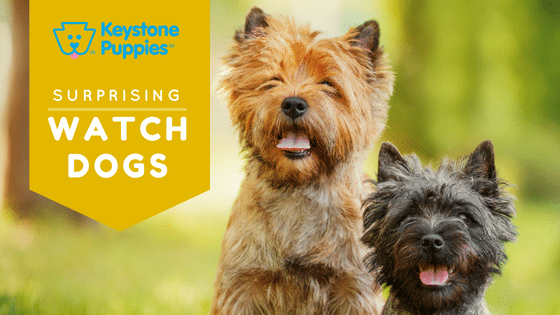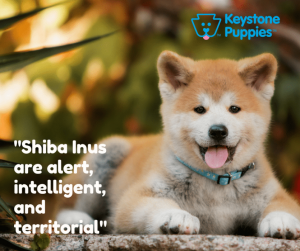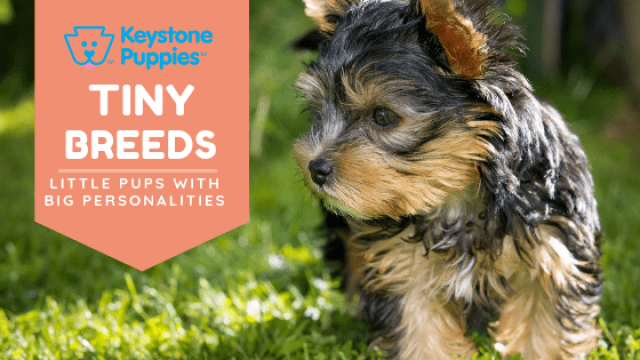Surprise! These Breeds Make Great Watchdogs.

Tenacious Terriers, Smart Sheepdogs, and One Adorable Lapdog
Watchdog breeds are loyal, intelligent, and naturally inclined to bark to alert owners of new or potentially threatening activity. While breeds like German Shepherds, Doberman Pinchers, and Rottweilers are well-known as fierce watchdogs, many smaller, less intimidating breeds are also adept at warning you of approaching strangers.
While a watchdog’s bark can be one of its most appealing features, it’s also desirable to train your dog when NOT to bark. After all, watchdogs are not always good judges of what constitutes a threat. They may try to protect you from relatively harmless elements such as doorbells, guests in the neighbor’s yard, passing bicycles, joggers, and mail carriers.
You should take the time to train your puppy to ignore common visitors, family, and friends. Teach your pup to save their barks for unknown people or animals. By training your dog to limit his barking to select “dangers,” you’ll reduce barking and help reduce your dog’s stress level. Get training tips for watchdogs here.
It’s important to note that the breeds we’re discussing here are watchdogs, not guard dogs. (See note at the end of this blog.) Our list of watchdogs will bark if they sense something different in their territory, and will warn you consistently.
If you’re ready to bring a watchdog into your life, and you’re prepared to spend extra time training them to bark at appropriate dangers, there are many great breeds to choose from. Watchdogs come in all shapes and sizes. Choose the breed that makes the most sense for your home, your personality, and your ability to provide appropriate exercise.
1. Australian Shepherds

Australian Shepherds are highly intelligent pups who love kids and families. They are relatively easy to train and respond well to lots of love and attention. Like most herding breeds, they need lots of exercise and intellectual stimulation to keep them calm and centered. Australian Shepherds do best in homes with large yards, or with an owner who can take them on long, daily walks. They also need a fair amount of attention and don’t like to be left alone for long periods of time. Because they are intelligent, teaching them complicated tasks like fetching specific items, picking up their toys, or solving dog puzzles, are excellent ways to help them stretch their mental muscles. These alert pups are natural watchers and barkers, making them a good watchdogs. Since they are a herding breed, you’ll find they like to chase, group, and herd people and animals. They may be tempted to nip at moving targets like joggers or running children.
2. Pomeranians
Pomeranians are curious and love to play. They prefer adults and don’t always do well in a house with young children. This breed is a great companion dog. They don’t like to be alone and are very protective of their owners. While short daily walks are needed, they don’t need as much vigorous exercise as other breeds. Their combination of curiosity, alertness, and loyalty makes them a natural watchdog. However, training is required since overexcited Pomeranians have been known to be ankle biters, or exhibit destructive behavior. Finally, these fluffy little puppies want and need a fair amount of brushing and grooming.

3. Chihuahuas

The tiny Chihuahua is loving, loyal, and enthusiastic watchdog. They adore their owners and are good with children. They don’t do well in extreme heat or cold and need a mild climate to thrive. Since they don’t need or want much exercise, they are a great apartment dog. However, as with all pups, short daily walks are a must. Chihuahuas are alert and naturally protective. Without proper training, they can become biters. By teaching your Chihuahua the difference between friends and foes, you will not only reduce your stress, but you will also help your pup relax.
4. Yorkshire Terriers

Yorkshire Terriers, also called Yorkies, are famous for combing adorable looks with fierce, insistence yaps. Yorkshire Terriers are loyal, loving dogs that are gentle around adult owners. However, their need for dominance means that they are not always a good match for families with small children. The Yorkshire’s excellent hearing combines with exceptional intelligence and alertness to make them wonderful watchdogs. However, because these small terriers were originally bred to hunt vermin, they are often overly confident of their abilities. They’ve been known to pick fights with larger dogs, and, if not responsibly trained, can become ankle biters.
5. Cairn Terriers

Made forever famous as the dog in the Wizard of Oz, Cairn Terriers were bred to hunt vermin. Although as cute and compact as a lapdog, the Cairn Terrier is full of spirit and energy. Cairn Terriers need vigorous exercise every day. They’re best for homes with large yards and open spaces, or for owners who are able to take their Cairn Terrier on long, daily walks. Like most watchdog breeds, this pup is very intelligent, alert, and protective. Their sharp bark serves as a warning of new activity. Take the time to train them as a selective watchdog to help them stay calm and centered.
6. Miniature Pinschers
 The Miniature Pinscher looks like a small Doberman Pinscher, but the breeds aren’t closely related. The Mini Pinschers’ intelligence, alertness, and loyalty make them great watchdogs. Originally bred to hunt vermin, they are so confident that they can get aggressive with larger dogs. Short daily walks are a must. However, this breed finds it hard to fight the urge to chase birds and small animals, so keep them leashed. While they don’t need lots of vigorous exercise, keep them entertained with toys and lots of one-on-one interaction. This high-stepping breed is an enthusiastic watchdog, but if you’re looking for a laid-back pup, this might not be the breed for you.
The Miniature Pinscher looks like a small Doberman Pinscher, but the breeds aren’t closely related. The Mini Pinschers’ intelligence, alertness, and loyalty make them great watchdogs. Originally bred to hunt vermin, they are so confident that they can get aggressive with larger dogs. Short daily walks are a must. However, this breed finds it hard to fight the urge to chase birds and small animals, so keep them leashed. While they don’t need lots of vigorous exercise, keep them entertained with toys and lots of one-on-one interaction. This high-stepping breed is an enthusiastic watchdog, but if you’re looking for a laid-back pup, this might not be the breed for you.
7. Miniature Schnauzers

Like so many terriers, Miniature Schnauzers are small dogs full of a feisty temperament. Bred to hunt vermin, they are extremely alert, intelligent, and loyal. They’re strong-willed and respond well to clear leadership by their owners. They’re also very good with children. Mini Schnauzers need lots of exercise, so large yards or long, daily walks are a must. Like many terriers, they need guidance and training to help them discern strangers from friends. Helping them understand their role as watchdog will reduce stress for you and your pup.
8. Shih Tzus
Cuddly, little Shih Tzus were originally bred as palace watchdogs in China. They’re one of the few lapdog breeds that also consistently alert owners to “intruders.” Shih Tzus are primarily companion dogs. While they should get short, daily walks, this breed is happy romping indoors and doesn’t require much exercise. They’re good with adults and children but are also alert and territorial.
This is one watchdog whose bark is not always limited to strangers or changes in their environment. Shih Tzus were bred to bark when anyone approached, not just strangers. If you want to minimize barking, tire your pup out with extra walks or more playtime before you leave for long periods of time. Spending time training your Shih Tzu not only helps reduce barking, but it also provides mental stimulation that helps keep them more calm and centered. However, because this breed has been bred as a watchdog for over 600 years, it will take a concerted effort to effectively control their barking.

9. Shiba Inus

Shiba Inus were originally bred as Japanese hunting dogs. Their handsome build, combined with loyalty, has made this breed increasingly popular in the U.S. Hardy Shiba Inus are energetic dogs that need a big yard or long, daily walks. This breed needs its owner to be a strong leader, or it can become stubborn or domineering. Shiba Inus are alert, intelligent, and territorial, which combine to make them excellent watchdogs. Like many hunting dogs, they have strong instincts to chase small animals, so be sure to keep them leashed on walks.
10. Shetland Sheepdogs

Shetland Sheepdogs, also called Shelties, are exceptionally intelligent and loyal. Like many herding dogs, Shelties are eager to learn. They do well with families and children, but overexcited Shelties can try to herd children or nip at their heels. Shetland Sheepdogs need big yards or long, daily walks to keep them from becoming restless or destructive. Their wariness of strangers combines with alertness and loyalty to make them ideal watchdogs. With a little training, Shelties will quickly learn when and how to alert you to different types of activities or threats.
A Word About Guard Dogs vs. Watchdogs
Watchdogs will bark when they sense danger, but they are not necessarily suited to protecting you from physical harm. Guard dogs usually have more physical strength and can be trained to protect you from intruders. Please remember that training a dog to physically protect you is complicated. It requires an experienced trainer and mandates a skilled handler. For your safety, the safety of your dog, and the safety of innocent bystanders, Keystone Puppies does not recommend training dogs to serve as personal protection. If are considering getting a dog for personal protection, we recommend discussing your options with a reputable trainer, and checking your local laws on ordinances, before making your decision. You may also want to consider some of the many electronic devices or security services available.
*****
Keystone Puppies cares about the health and well-being of dogs. Research breeds carefully before making a choice. Remember that even dogs bred for specific purposes require competent and consistent training to reach their full potential. Providing the proper level of exercise is one of the most effective ways to channel your dog’s energy away from undesirable or destructive behavior. If you’re not sure which breed is right for you, research over 200 dog breeds here. If you’re ready to look for your new puppy now, click here.






